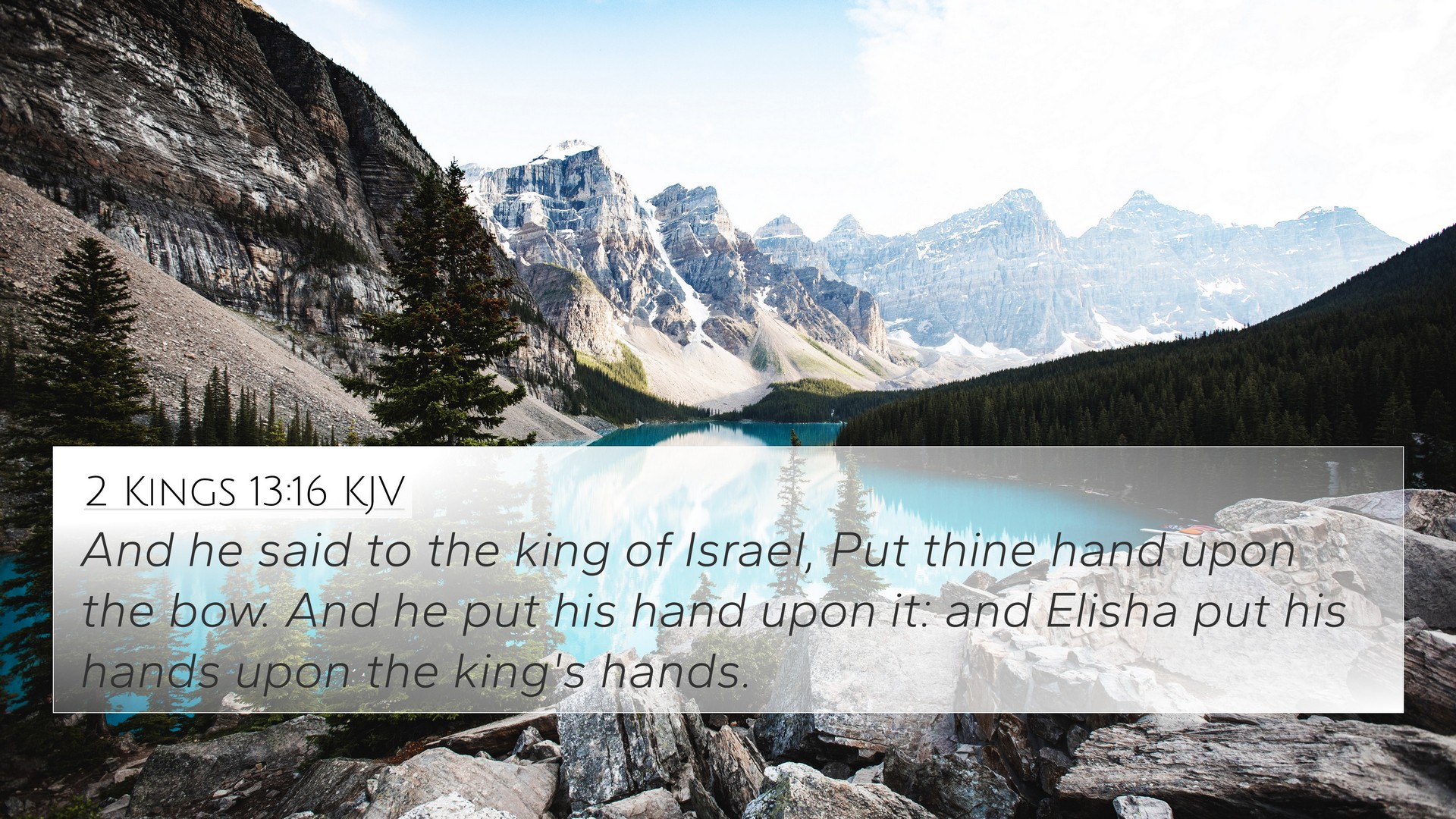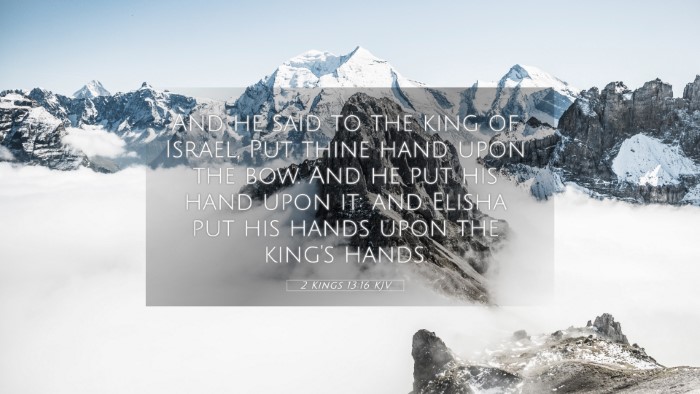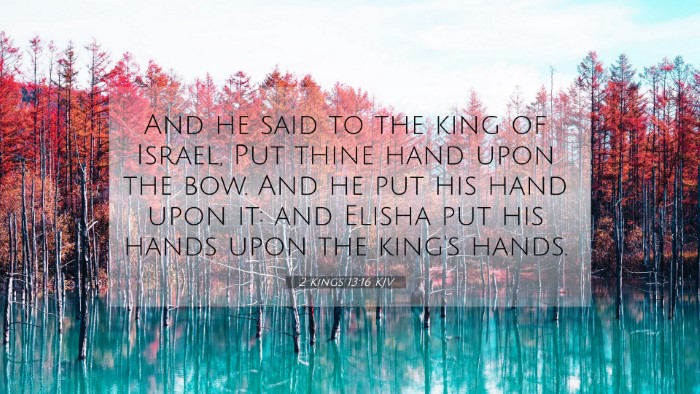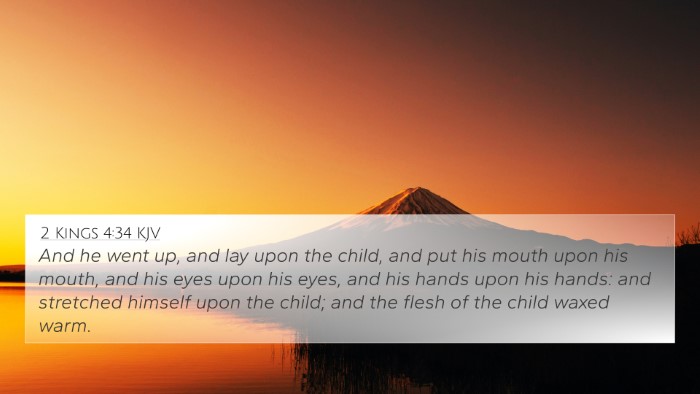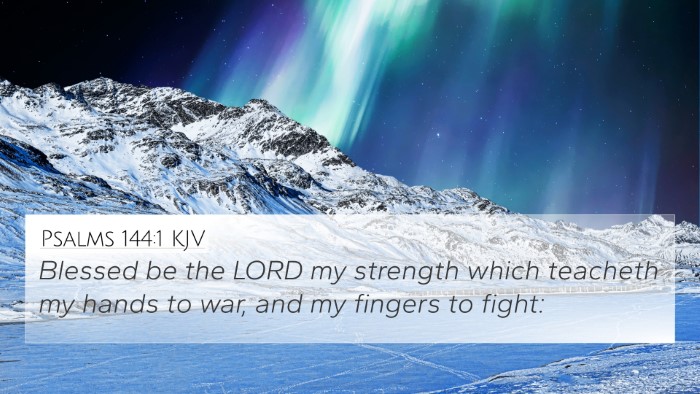Understanding 2 Kings 13:16: A Comprehensive Analysis
The verse 2 Kings 13:16 records a significant moment in the life of the prophet Elisha, as he interacts with King Joash of Israel. It captures a moment of prophetic action that indicates spiritual significance and the ongoing narrative of Israel’s relationship with God, especially in times of turmoil.
Verse Text
2 Kings 13:16: "And he said to the king of Israel, 'Put your hand upon the bow.' And he put his hand upon it: and Elisha put his hands upon the king's hands."
Verse Meaning and Insights
This verse holds multiple implications for understanding the prophetic ministry in the Old Testament, specifically through the ministry of Elisha. The commentaries contribute to a deeper understanding of the actions and symbolism presented in this passage.
- Matthew Henry:
Henry emphasizes the active participation of King Joash in receiving God’s direction through Elisha. By placing his hands on the bow, Joash symbolizes readiness and obedience to divine promised victory. The act signifies that true power lies in God’s hands, mediated through His servant.
- Albert Barnes:
Barnes draws attention to the symbolism of the bow as a weapon of warfare and divine justice. The King’s gesture represents reliance on God’s strength to achieve victory against adversaries, highlighting the covenant relationship between God and Israel.
- Adam Clarke:
Clarke takes note of the practical implications of the act. Placing hands upon the bow illustrates the transfer of prophetic authority to Joash. It signifies that success in battle (against the Syrians) would depend on his faithfulness and actions in alignment with divine commands.
Key Themes
This verse encapsulates several interrelated themes found throughout Scripture:
- Divine Guidance: The role of the prophet as a mediator between God and His people.
- Symbolism of Weapons: The bow as a representation of God’s protection and power against enemies.
- Obedience to God’s Will: The necessity of human cooperation in fulfilling divine plans.
Cross-References and Related Verses
To better understand 2 Kings 13:16, several Bible verses can be cross-referenced:
- 1 Kings 19:16 – Anointing Elisha as a prophet to prepare Israel for future challenges.
- 2 Kings 13:14 – Elisha’s prophetic role in encouraging Joash during trying times.
- Psalm 127:1 – A reflection on the necessity of God’s involvement in human endeavors.
- Jeremiah 1:19 – Assurance that God’s words through the prophets will prevail against opposition.
- Isaiah 54:17 – The promise that no weapon formed against His people shall prosper.
- Hebrews 11:34 – Reference to the power of faith in defeating enemies.
- 2 Chronicles 20:15 – An example of divine strategy in battle through prophetic counsel.
- Luke 1:17 – The prophetic role of John the Baptist, emphasizing continuity in God’s plan.
- 2 Timothy 3:16-17 – Inspiration of the Scriptures as guidance for righteousness.
- Acts 19:11-12 – The power of God in the ministry of the apostles and all believers.
Thematic Connections
The relationships to the broader narrative of Scripture further illustrate the importance of divine guidance, human obedience, and the prophetic mission. It establishes a thematic connection that runs throughout the Bible, particularly in the context of covenantal expectation and fulfillment.
Tools for Further Study
For those interested in delving deeper into cross-referencing and understanding biblical texts, consider utilizing:
- Bible Concordance: To find words and themes across the Bible.
- Bible Cross-Reference Guide: Helps identify verses linked by themes and context.
- Cross-Reference Bible Study: Effective methods to explore connections between verses.
- Bible Chain References: Study materials that trace thematic links through the Scriptures.
- Comprehensive Bible Cross-Reference Materials: Collections that provide extensive inter-linking of biblical texts.
Conclusion
The verse 2 Kings 13:16 invites readers to reflect on the seriousness of aligning themselves with God’s direction. Through the prophetic actions of Elisha, clarity and empowerment are offered to King Joash, which can also be applied to modern life as believers seek to understand their path in faith. Exploring related verses and employing cross-referencing tools enriches one's study of the Bible, uncovering deeper meanings and insights.
